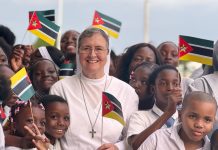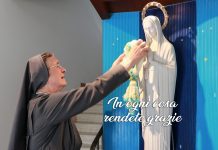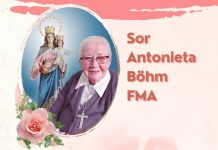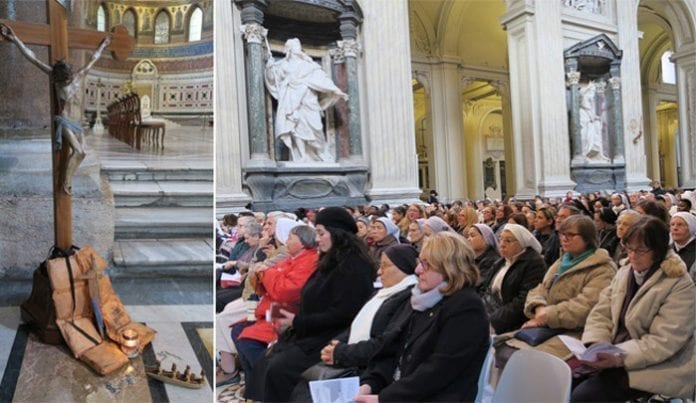Rome (Italy). On February 8, 2018, the Church celebrates the liturgical memorial of St. Josephine Bakhita, a Sudanese woman who was kidnapped at the age of 8 and was sold to merchants of human beings. She became a religious after having experienced the humiliations and the physical and moral sufferings of slavery.
The World Day of Prayer and Reflection against Human Trafficking promoted by the Unions of Superiors General of Religious Institutes has celebrated her feast at this time for the past four years. The theme chosen for this year is “Migration without trafficking. Yes, to freedom! No to trafficking! “.
Two significant events animated consecrated persons and the laity, together with young people committed to eradicate the scourge of trafficking and of young victims being trafficked, prostituted, and violated in their dignity. For the Institute of the Daughters of Mary Help of Christians there was a large group of FMA from the Communities of the Preprovince (RMC) and of the FMA Generalate, young people from Mary Help of Christians in Via Dalmazia – Rome, and the collaborators of the Youth Pastoral and Social Communication sectors: the latter was also involved in their organization and animation, and in particular, in the Study Seminar on “Migration and Trafficking”, held on 28 November 2017 in Rome at the LUMSA University (in the morning) and at other locations (in the afternoon)).
The second event, the vigil of prayer and reflection “Light a light against trafficking” was held on February 3rd, at St. John Lateran Basilica and focused on the tragedy of trafficking of people among itinerant populations: migrants, refugees, and displaced persons.
The Study Seminar: Trafficking of people and smuggling (or trafficking) of migrants are two different realities that are increasingly intertwined with each other. The violence and exploitation suffered by migrants who set off on their journey without having an entry visa to another country are often identified as trafficked people. The vulnerability caused by their status makes them easy prey for sexual and labor exploitation. In the globalized world, migratory flows have increased; this is offset by increasingly restrictive migration policies by many countries. This situation increases the vulnerability of migrant populations, which have become, all over the world, a group at high risk for trafficking of persons, both during transport, in transit countries, and once they arrive at their destination.
Abysmal differences between populations and nations generate unthinkable routes: this is the world phenomenon that the third millennium has to face. The speakers, experts at the international level, the assembly interventions, the workshops, the interaction experienced during the study day have raised questions such as: why choose a rather uncomfortable and risky crossing in the sea rather than comfortable flights by plane? Why should we become “refugees” and “shipwrecked” to reach Europe? The same question could apply to other tens of thousands of people who are starting their journey looking for work in countries considered “rich”. And the answer could come from another question: how valuable is a passport? Which countries does it allow access to?
Just a trivial comparison to understand the expensive traffic that afflicts those who emigrate from certain countries. Those who decided to leave Italy in 2017 could obtain free entry in 160 countries, while those emigrating from Pakistan could only legally enter 29. The Nigerian passport guaranteed access to 44 countries, including the Ivory Coast, Guinea, Guinea Bissau, Liberia, Mali, Niger, Haiti and Micronesia. These incredible discrepancies in the value of passports can easily be known by everyone.
This is why a “Global Pact on Migration” is indispensable: we need international management of the flow of people to prevent that the trafficking of migrants, often dehumanizing, and the trafficking of people, always dehumanizing, do not become a dangerous industry because it is criminal.
The moment of prayer, organized by the National Usmi and the Uisg-Talita Kum, and animated by the choir of the community of Saint Egidio, opened with a procession during which religious, consecrated persons, and foreign citizens brought to the feet of a Crucifix placed next to the altar, a life jacket, pieces of boats assembled in the shape of a cross, chains, a tasbeeh (the Muslim rosary) found on a beach of Pozzallo (Ragusa) following a landing, and a lamp to represent the light of prayer for freedom against all forms of slavery.
Two Bishops accompanied the meditation and prayer: Msgr. Paolo Lojudice, Auxiliary Bishop of the southern sector of Rome and the Migrants’ delegate for Lazio, who pausing on the parable of the Good Samaritan said: “to practice true charity, we must not concentrate on ourselves but have an impetus towards others, committing self and placing our time at the disposal of those who are more fragile. It is in everyday relationships that solidarity is enacted to be aware that we are all human beings. He then recalled that every year thousands of people leave their land to escape from poverty and there are many women who end up in the whirlwind of exploitation through prostitution”.
Monsignor Angelo De Donatis, Vicar General for the Diocese of Rome, who presided over the Eucharistic celebration, was particularly impressed by the presence of the chains and said: “Looking at them positioned in front of the Crucifix, I once again thought that true liberation is always the fruit of Easter. Jesus crucified, dead, and risen can truly accomplish liberation. The strength of the risen life of Jesus is not limited to freeing from evil but causes the experience of evil to be transformed into a place where a greater good is manifested. On the one hand, we must proclaim what we live and on the other, what we proclaim changes our existence by raising us from the sickness of our individualism to make us everything for everyone”.
Two events, one invitation: to know and reflect to continue to act, to pray, and to celebrate because the grace of the God of mercy makes us more compassionate and capable of gestures of consolation towards many suffering and vulnerable sisters and brothers, especially the young people.
Gabriella Imperatore




















